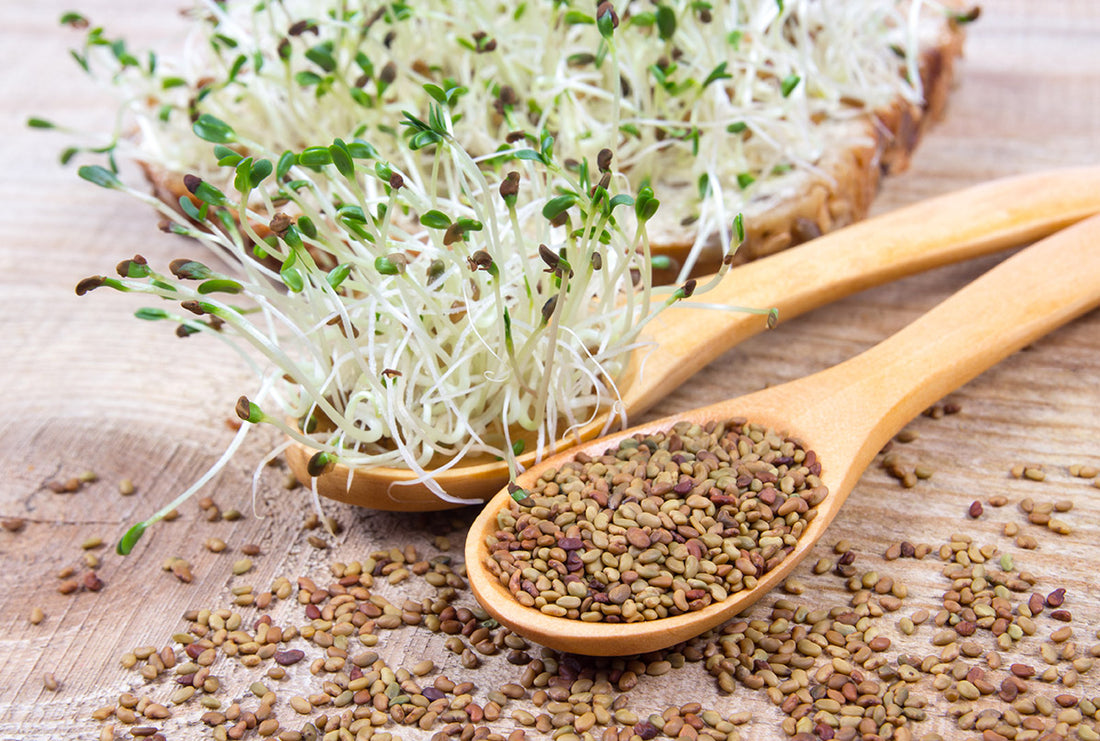Alfalfa – what kind of plant is it?
Let us go back to ancient times for a moment. It is from that period that alfalfa comes from, then cultivated only in the Middle East, where it is still known as "alfalfa", from the Arabic "father", which in this case means "father of food". This plant is of great importance in Ayurvedic medicine (traditional Indian medicine) and has been used as a basis for natural treatment for years. It was brought to Europe by Alexander the Great himself, thanks to which most of the world could also become familiar with its unique properties. You are probably wondering at this point: what makes alfalfa so valuable to our health?
One could certainly talk for a long time about the extraordinary properties of this plant, which looks like a meadow clover. It is worth mentioning its high content of protein, enzymes, carotene, flavonoids, alkaloids, saponins, sterols and calcium, as well as valuable vitamins and minerals. Also worthy of attention is its ability to stabilize blood sugar levels and reduce insulin resistance. Alfalfa is also perfect for problems related to the poor condition of hair or nails. With its help, you will quickly and easily restore the beautiful appearance of your skin in a natural way.
Is a healthy lifestyle your true passion? Then we certainly understand each other well. When we first encountered this plant, we knew from the very beginning that it would stay with us for a long time. The multitude of health-promoting properties still amazes us today
fascination, which is why we would like to share with you a lot of information about this wonderful wealth of nature. In the following we will tell you, among others: about how alfalfa improves the functioning of some internal organs. We will also dispel your doubts about many other issues in the field of natural health prevention using this plant.
Natural multivitamin – rich in nutrients
Now that you know where alfalfa comes from and know some details about its basic use, it is worth focusing on a more in-depth analysis of the beneficial effects of this plant on your body. After all, it is not without reason that the term "natural multivitamin" appeared in the introduction to this article.
The huge content of nutrients valuable for health makes alfalfa an extremely valuable choice if you want to ensure a greater presence of natural products in your diet. With the help of this unique plant, you will support a number of different processes occurring every day in the body and replenish the deficiencies of essential substances. So what vitamins does alfalfa contain? You will find the answer in the list below:
· B vitamins,
· vitamin C,
· vitamin D,
· Vitamin E,
· vitamin K
· biotin (vitamin B7 or H)
· Folic acid.
It is worth adding that alfalfa also contains beta-carotene, from which vitamin A is produced in the body using liver enzymes. By including this plant in your daily diet, you will also provide yourself with valuable mineral salts such as:
· potassium,
· iron,
· calcium,
· magnesium,
· silicon
· and phosphorus.
As you can see, alfalfa has an exceptionally rich vitamin composition, which makes it so appreciated by lovers of a healthy, balanced diet. If you also feel the need to take more conscious care of your body, we can guarantee that including this ingredient in your daily diet will certainly be beneficial to you. It's time to find out what exactly alfalfa helps with - the healing properties of this plant are very wide, but we will soon reveal more secrets to you.
Alfalfa - use for various needs
In addition to information about the content of specific vitamins and mineral salts present in alfalfa, it would also be good to know the exact uses of this special plant and its medicinal capabilities. It's really exciting how much health potential there is in nature, isn't it? The positive and universal effect on the body demonstrated by this good of nature proves its extraordinary usefulness in the diet also for the elderly. Remember that as you age, you do not have to accept serious weakness and a decline in vitality - it is always the perfect time to take better care of yourself and support your health. Learn about the basic uses of alfalfa and how beneficial it can be to your body.
Digestive system disorders
What is alfalfa? Many people with digestive system disorders certainly know the answer to this question. Tiring flatulence, indigestion and lack of appetite are some of the main problems that can be alleviated with the help of this plant. Its properties that influence the faster regeneration of the digestive mucosa will also help you effectively eliminate irritations. If you are not sure how to consume alfalfa, tea, ground dried powder or sprouts of this plant will be a good solution.
Oral irritations
If you suffer from oral irritation, alfalfa will help you speed up the regeneration process of the mucous membranes. All you need to do is prepare a mouthwash from this plant to obtain the desired antiseptic effect, thanks to which the annoying pain will disappear and you will regain the pleasure of eating meals.
Painful periods
If you are struggling with painful and heavy periods, alfalfa infusion may be a good solution. Its antispasmodic properties will also help alleviate the negative symptoms of menopause, making it a great option for women of all ages.
Weakened immunity
Alfalfa sprouts can also be used as important support for a weakened immune system. If your immune system sometimes fails and you catch colds easily, it will be good to introduce this natural ingredient into your daily diet. Alfalfa also helps slow down the aging process, so you don't have to say goodbye to the beautiful condition of your skin, hair or nails. Additionally, this plant will also have a positive impact on good sleep, so you will wake up in the morning with a smile on your face.
Problems with the circulatory system
It is also worth taking a closer look at the positive effect of alfalfa on the circulatory system. The substances contained in this plant effectively reduce cholesterol levels and are even able to reduce the symptoms of atherosclerosis, leading to its regression. Therefore, if you are struggling with circulatory system problems, alfalfa can provide great support, thanks to which you can also take care of yourself using natural methods.
Answering the questions about what alfalfa is and what it does is probably no longer a challenge for you. So let's find out what connection this plant has with the category known as superfoods.
Alfalfa and superfoods
Superfood products have been very popular among lovers of healthy eating for a long time. Do you know what exactly lies behind this special name? Examples of these particular foods can be described as naturally containing a huge supply of health-promoting nutrients that support the proper functioning of the body.
The superfood category includes, among others: plant sprouts. Therefore, it is really worth including them in your daily diet and thus strengthening it with valuable nutritional values. This is probably a good time to admit that it took some time until we found the right plant source rich in health-beneficial substances. After analyzing many materials and scientific publications, it turned out that alfalfa sprouts were an excellent choice and our effort was worth it.
Why was this particular plant the best? The superfood of alfalfa sprouts contains all 9 exogenous amino acids, which are not produced by the body and must be supplied with the diet. One product with such a rich impact on health! Alfalfa in the diet is therefore a properly balanced source
protein, and its role in the body allowing, among others, for the reconstruction of damaged tissues remains invaluable.
Sprouts are also an extremely convenient type of food, which can be sprinkled on a sandwich, a dinner dish or eaten directly as an addition to any other meal. So you don't have to spend too much time in the kitchen to prepare something healthy, especially if you don't have much time. You can also find alfalfa sprouts in powdered form. These types of products are perfect for enriching a smoothie, yogurt or porridge with a healthy addition, significantly increasing the nutritional value of a regular meal.
If healthy eating is one of your main interests, you may have thought about growing sprouts yourself a few times, but you can't find the time or have the enthusiasm. Ready-made products are the most appropriate solution in such a case. Moreover, growing sprouts yourself may involve the risk of developing harmful and health-threatening pathogens in food. Therefore, if you do not have experience or confidence in how to go about it, it is better to choose proven manufacturers who prepare specific products under constant protection and in professional conditions.
Alfalfa sprouts - summary
Today's journey together through the world of healthy, conscious and plant-based eating turned out to be very pleasant and at the same time rich in knowledge. So from now on, you can approach your diet more consciously and choose natural solutions. With the deep nutritional effect of alfalfa sprouts, you will enrich your body with valuable antioxidant and regenerative properties. It is worth adding that this plant contains the so-called saponins and other bioactive compounds have antioxidant and antiviral properties. One more piece of news will surely bring you much joy. Due to its plant origin, alfalfa is an example of an extremely health-promoting product that both vegans, vegetarians and people on traditional diets can get to know better. I think it's time to prepare another healthy meal, enjoy your meal!

Bibliography:
1. https://www.ncbi.nlm.nih.gov/pmc/articles/PMC8398379/
2. https://www.ncbi.nlm.nih.gov/pmc/articles/PMC10582054/
3. https://www.scholarsresearchlibrary.com/articles/medicago-sativa-leaf-extract-supplementation-corrects-diabetesinduced-dyslipidemia-oxidative-stress-and-hepatic-renal-fu.pdf
4. https://www.ncbi.nlm.nih.gov/pmc/articles/PMC10582054/#b0070
5. https://innovareacademics.in/journal/ijpps/Vol6Suppl2/8660.pdf
6. https://polytechnic-journal.epu.edu.iq/cgi/viewcontent.cgi?article=1646&context=home
7. https://pubmed.ncbi.nlm.nih.gov/18930871/
8. https://www.tandfonline.com/doi/full/10.3109/13880209.2010.504732
9. https://www.poradnikzdrowie.pl/zdrowie/leki/lucerna-wlasciwosci-zastosowanie-suplementacja-aa-DTAx-cCqV-PdnZ.html#google_vignette
10. https://zdrowie.gazeta.pl/Zdrowie/7,101580,28097822,lucerna-wlasciwosci-lecznicze-powiedz-warto-siegnac-po-lucerne.html


